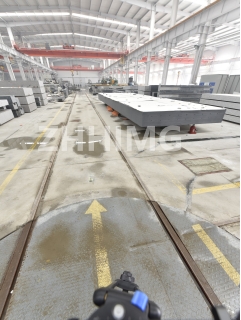Granite components are an essential part of semiconductor equipment. They are widely used in the manufacturing industry, and these components play a vital role in the high-precision machining involved in producing semiconductor products. Therefore, it is crucial to ensure that the granite components meet the required standards for quality control and inspection.
There are several methods used for quality control during granite component production. The first step is to carry out an inspection of the raw materials used, which should be of high quality and free from any defects. The material must also meet the specified standards and requirements. The most common materials used in the production of granite components are black granite and gray granite, which are corrosion-resistant and have a high hardness.
Once the raw materials have been selected, the manufacturing process begins. During production, quality control measures are put in place to ensure that the granite components produced meet the required standards. These measures include regular monitoring of production processes, assessment of product quality, and analysis of any defects that may arise.
One critical aspect of quality control in the production of granite components is ensuring that the machines used are calibrated and maintained regularly. This is particularly important for machines that perform high-precision machining required for the production of semiconductor components. Proper maintenance and calibration of these machines help to ensure consistent and accurate production of granite components.
Inspection of granite components is also essential. The inspection process involves measuring the dimensions, flatness, and perpendicularity of the components to ensure that they meet the specified tolerances. Inspection is carried out using precision tools such as laser interferometers, coordinate measuring machines, and surface plates. Inspection results are recorded and then compared with the specified tolerances to determine whether the product meets the required standards.
In addition to inspection and quality control measures, it is also essential to handle and store granite components appropriately. Proper storage helps to prevent damage from vibration, shock, and other external factors that may affect the component's quality. Granite components should be stored in a clean and dry environment to prevent corrosion.
In conclusion, the quality control and inspection of granite components are vital aspects to consider during semiconductor equipment manufacturing. From the selection of raw materials to the inspection of the finished product, strict quality control measures must be put in place to ensure that the products meet the required standards. Through regular monitoring and calibration of production machines and inspection of the final product, manufacturers can produce high-quality granite components that meet the demanding requirements of the semiconductor industry.
Post time: Mar-20-2024

